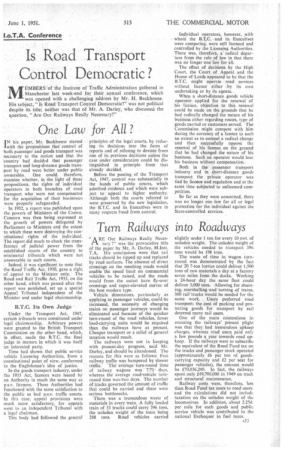Is Road Transport Control Democratic?
Page 59

If you've noticed an error in this article please click here to report it so we can fix it.
MEMBERS of the Institute of Traffic Administration gathered in Manchester last week-end for their annual conference, which was opened with a challenging address by Mr. H. Backhous.e. His subject, "Is Road Transport Control Democratic?" was not political • despite its title: neither was that of Mr. A. Darley, who discussed the question, "Are Our Railways Really Necessary?"
One Law for All ?
IN his paper, Mr. Backhouse started I with the propositions that control of 'both passenger and goods transport was necessary to the nation and that the country had decided that passenger transport and long-distance goods transport by road were better under public ownership. One could, therefore, examine whether, in the light of these propositions, the rights of individual operators in both branches of road transport who , were not compensated for the acquisition of their businesses were properly safeguarded.
• In 1932, a report was published upon the powers of Ministers of the Crown. Concern was then being expressed at the growth of powers delegated by Parliament to Ministers and the extent to which these were destroying the constitutional rights of the individual. .The report did much to check the transference of judicial power from the established courts of the country to ministerial tribunals which were not answerable to such courts.
. Indeed, it was significant to note that the Road Traffic Act, 1930, gave a right of appeal to the Minister only, The Road and Rail Traffic Act, 1933, on the other hand, which was passed after the report was published, set up a special Appeal Tribunal independent of the Minister and under legal chairmanship.
B.T.C. Its Own Judge
Under the Transport Act, 1947, certain tribunals were constituted under legal chairmanship. Arbitrary powers were granted to the British Transport Commission on the other hand, which, in effect, made the B.T.C. the final judge in matters in which it was itself an interested party.
Time had shown that public service vehicle Licensing Authorities, from a constitutional point of view, conformed to the Englishman's idea of justice.
In the goods transport industry, under the 1933 Act, licences were issued by an Authority in much the same way as p.s.v. licences. These Authorities had functioned with the same satisfaction to the public as had p.s.v. traffic courts. In this case, appeal provisions were much more satisfactory, for appeals went to an independent Tribunal with a legal chairman.
This body had followed the general
principles of the legal courts, by reducing its decisions into the form of reports and of refusing to deviate from one of its previous decisions unless the case under consideration could be distinguished in principle from that already decided.
Before the passing of the Transport Act, 1947, control was substantially in the hands of public courts, which admitted evidence and which were subject to appeal to higher authority. Although both the courts referred to were preserved by the new legislation, theB.T.C. and its Executives were in many respects freed from control.
Individual operators, however, with whomi the B.T.C. -and its Executives were competing, were still licensed and controlled by the Licensing Authorities. There was, therefore, a' radical departure from the rule of law in that there was no longer one law for all.
The effect of decisions by the High Court, the Court of Appeal and the House of Lords appeared to be that the B.T.C. might operate road services without licence either ..-by its own undertaking or by its agents..
When a short-distance ;pods vehicle operator, applied for the renewal of his licence, objection to this renewal could be made on the grounds that he had radically changed the nature of his business either regarding routes, type of goods carried or customers served. The Commission might compete with him during the currency of a licence to such an extent as to compel a radical change and then successfully oppose the renewal of his licence on the ground that he had changed the nature of his business. Such an operator would lose his business without compensation.,
Both in the passenger transport industry and in short-distance good.; transport the private operator was tied by licence and regulation and at the same time subjected to unlicensed competition.
So far as they were concerned, there was no longer one law for all or legal protection for the individual against the State-controlled services.




























































































